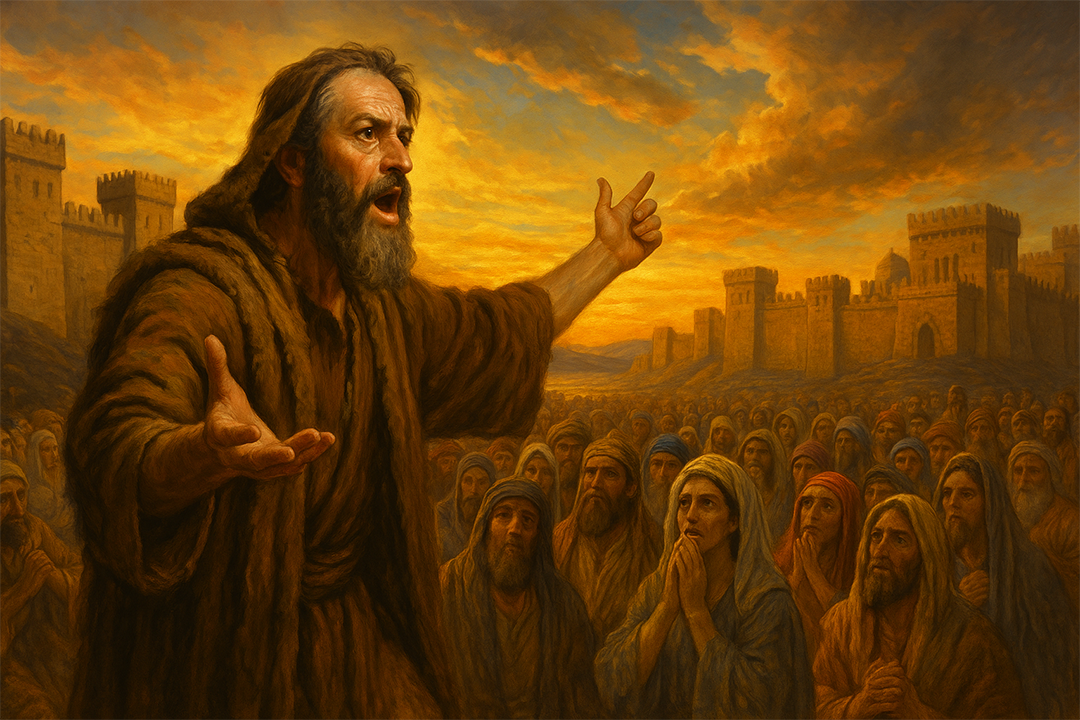A God of Second Chances
“Then the word of the Lord came to Jonah a second time…” — Jonah 3:1
Read Jonah 3:1-10 on Bible.com
There’s a quiet grace in that opening verse.
God could’ve been done with Jonah.
He had every right to be.
Jonah had run hard in the opposite direction.
He boarded a ship to Tarshish to escape his calling.
And even after the storm, the sea, and the belly of the fish, God didn’t scold him.
He called him again.
“The word of the Lord came to Jonah a second time…”
Our God is not a one-and-done God.
He is the God of second chances.
He’s the God who calls again—even when we’ve failed.
Even when we’ve rebelled.
Even when we’ve been swallowed whole by the mess we made.
This is grace. Something we didn’t earn or deserve.
From the Belly to the City
Jonah, freshly vomited from the belly of the fish, is probably still reeking of seaweed and shame. And now, God says again:
“Go to the great city of Nineveh and proclaim to it the message I give you.” -Jonah 3:2
And this time, Jonah obeys.
He walks into a city known for violence, cruelty, and wickedness.
Nineveh was the capital of the Assyrian empire—a name that struck terror in the hearts of Israel.
To the Israelites, Nineveh was evil incarnate. It was the enemy.
And now Jonah was to walk through its gates, tell them to repent, and declare:
“Forty more days and Nineveh will be overthrown.” – Jonah 3:4
The irony?
The name Nineveh is believed by some to mean “house of fish” or “city of the fish.”
Jonah, the man who had just been swallowed by a great fish, is now walking into the city of the fish with a message of mercy.
Talk about humbling.
When Repentance Begins With “Maybe”
What happens next is extraordinary.
The people of Nineveh believe God.
They declare a fast—from the greatest to the least.
Even the animals are covered in sackcloth.
And then the king rises from his throne, removes his royal robes, puts on sackcloth, and sits in ashes.
He doesn’t offer excuses.
He doesn’t demand a debate.
He doesn’t fight back.
He simply says:
“Let everyone call urgently on God. Let them give up their evil ways and their violence. Who knows? God may yet relent and with compassion turn from his fierce anger so that we will not perish.” – Jonah 3:8–9
Who knows?
That’s not the voice of confidence.
That’s the voice of desperation.
That’s the trembling voice of humility.
And it’s enough.
When God Saw What They Did
“When God saw what they did and how they turned from their evil ways,
He relented and did not bring on them the destruction He had threatened.”
Jonah 3:10
Pastor Reed said something that stuck with me:
“We all have a Nineveh.”
Maybe it’s a person you’ve written off.
Maybe it’s a group you’ve hardened your heart toward.
Maybe it’s a part of yourself you think God could never redeem.
Or maybe… you are Nineveh.
And you’ve been wondering if there’s still a chance left.
Hear me clearly:
There is.
God isn’t done with you.
The Word of the Lord can still come a second time, a third time, and fourth time.
Takeaways & Application
- God is patient. Even when we run, He waits. He calls again.
- Repentance isn’t about guarantees. It’s about humbling ourselves even when the outcome is uncertain.
- God relents. Not because He’s weak, but because He’s compassionate.
- You are never too far gone. Neither was Nineveh. Neither was Jonah.
Closing Prayer
Lord,
Thank You for being the God of second chances.
Thank You that when we fall, You still call.
When we rebel, You still pursue.
Help us to obey—not reluctantly, but willingly.
Help us to love those we’ve judged as unworthy.
And help us never forget that You can save anyone… including us.
In Jesus’ Name,
Amen.
Word Study: Jonah 3
- “The word of the Lord came to Jonah a second time”
Hebrew: דְּבַר־יְהוָה (devar YHWH)
Key Word: Devar (דָּבָר) – word, message, matter
- Theological Insight: “Devar” is not just a spoken word—it carries the weight of intention, power, and action. When God speaks, it accomplishes something (see Isaiah 55:11).
- Devotional Depth: This second calling shows God’s mercy and persistence. Jonah is being re-commissioned despite his disobedience. The phrase can also be linked to how the Word (Jesus) is sent into the world—relentless, redemptive, and unyielding in purpose.
- Theological Insight: “Devar” is not just a spoken word—it carries the weight of intention, power, and action. When God speaks, it accomplishes something (see Isaiah 55:11).
- “Nineveh was a very large city”
Hebrew: נִינְוֵה הָיְתָה עִיר־גְּדוֹלָה לֵאלֹהִים (Ninveh hayetah ir-gedolah le’Elohim)
Key Phrase: “Ir gedolah le’Elohim” – a great city to God
- Theological Insight: The phrase doesn’t just mean it was big in size—it implies that Nineveh was important to God. This changes the tone of the narrative: God doesn’t just save Israel or “the good guys”—He is moved by compassion for even the most wicked.
- Devotional Depth: Who or what is “great” in our eyes vs. God’s? This verse reminds us that God’s love extends to people we might overlook, avoid, or even despise.
- Theological Insight: The phrase doesn’t just mean it was big in size—it implies that Nineveh was important to God. This changes the tone of the narrative: God doesn’t just save Israel or “the good guys”—He is moved by compassion for even the most wicked.
- “Yet forty days, and Nineveh shall be overthrown!”
Hebrew: עוֹד אַרְבָּעִים יוֹם וְנִינְוֵה נֶהְפָּכֶת (od arba’im yom ve-Ninveh nehpachet)
Key Word: Nehpachet (נֶהְפָּכֶת) – overturned, overthrown, turned around
- Theological Insight: This word is purposefully ambiguous. It can mean destroyed (as in Sodom and Gomorrah), or transformed/reversed. This duality is important: Nineveh was not destroyed—it was transformed. The threat leads to grace.
- Devotional Depth: Sometimes God’s warnings are invitations to change. What areas of our life need to be “overturned”—not in judgment, but in mercy?
- Theological Insight: This word is purposefully ambiguous. It can mean destroyed (as in Sodom and Gomorrah), or transformed/reversed. This duality is important: Nineveh was not destroyed—it was transformed. The threat leads to grace.
Watch the Sermon that Inspired this Post
Gwinnett Church: The Book of Jonah Part 3: The God of Second Chances


Leave a Reply